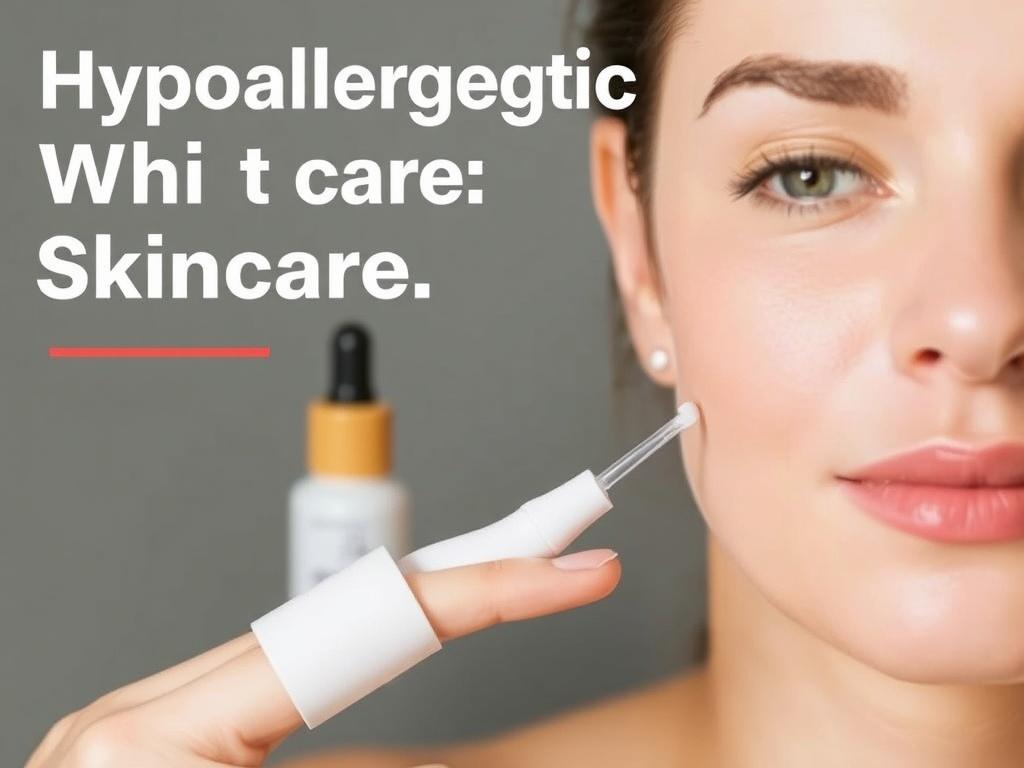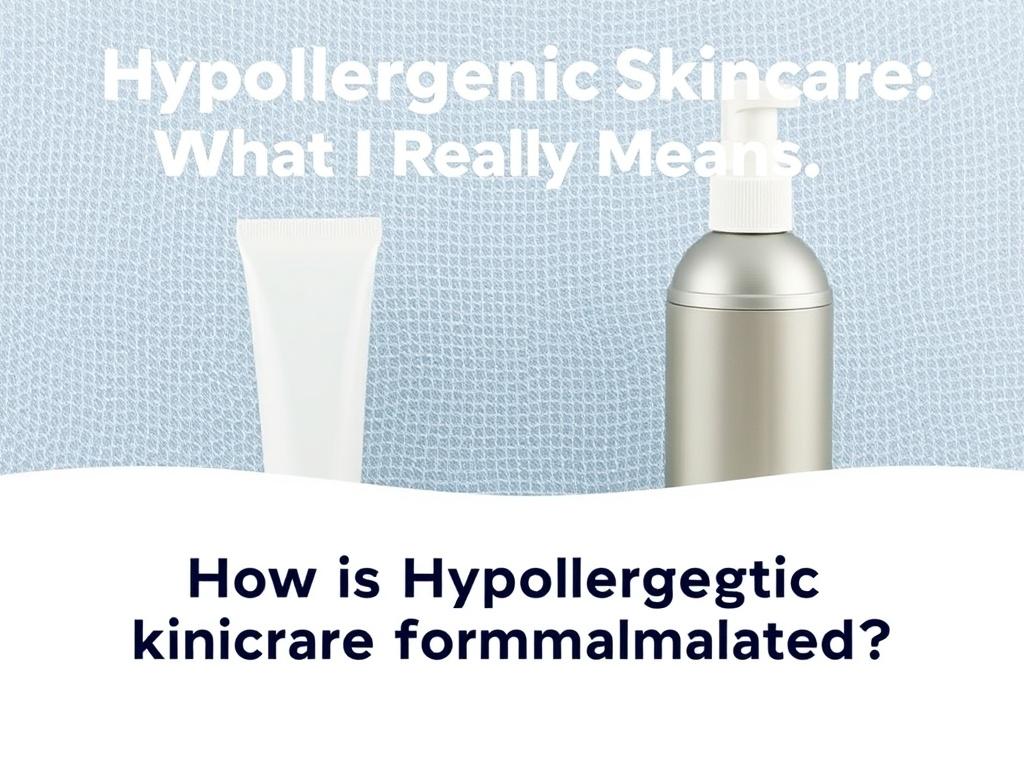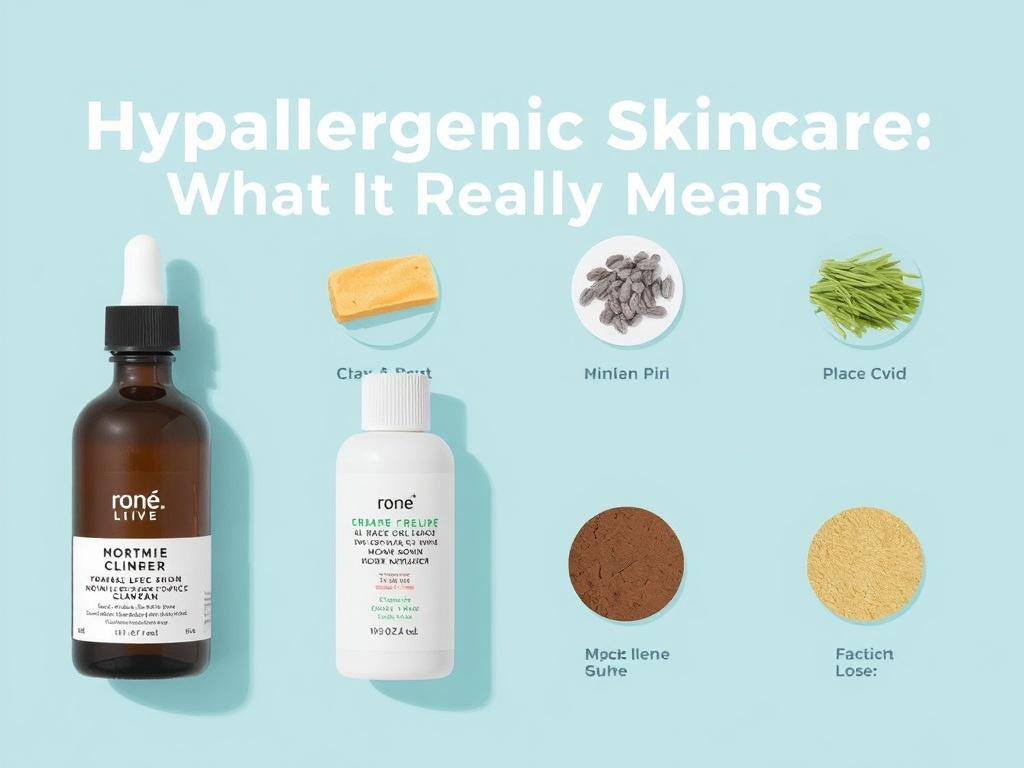Содержание статьи
- 1 Understanding the Basics of Hypoallergenic Skincare
- 2 Why Do Allergic Reactions Happen in Skincare?
- 3 How Is Hypoallergenic Skincare Formulated?
- 4 Is Hypoallergenic Skincare Always Safe for Sensitive Skin?
- 5 Decoding Product Labels: What Does “Hypoallergenic” Mean Legally?
- 6 Popular Ingredients Often Found in Hypoallergenic Skincare
- 7 Myths and Misconceptions Around Hypoallergenic Skincare
- 8 Tips for Incorporating Hypoallergenic Skincare into Your Routine
- 9 Brands Known for Hypoallergenic Skincare
Understanding the Basics of Hypoallergenic Skincare
When you stroll down the beauty aisle or browse online for skincare products, one term you’re likely to encounter frequently is “hypoallergenic.” But what does hypoallergenic skincare really mean? Many people assume it guarantees a product won’t cause any allergic reactions, but the reality is more nuanced. Hypoallergenic skincare is designed to reduce the risk of allergies, but it does not absolutely ensure that every user will be free from a reaction. Understanding this term helps you make smarter choices for your skin, especially if you have sensitive skin or a history of allergies.
Hypoallergenic literally means “less likely to cause an allergic reaction.” The term originated in the cosmetics industry as a way to describe products formulated to minimize potential allergens. The fact is, people’s skin is incredibly diverse, and what might irritate one person could be perfectly fine for another. Allergic reactions stem from the immune system’s response to certain ingredients, which means that a product labeled as hypoallergenic typically avoids the most common irritants but is not allergen-proof.
Why Do Allergic Reactions Happen in Skincare?

Allergic reactions in skincare usually happen when specific substances trigger the body’s immune system. These substances are called allergens. The skin, acting as a barrier, can sometimes become sensitized or overstimulated by these allergens, resulting in redness, itching, swelling, or more severe reactions.
Some common ingredients that might cause allergic responses include fragrances, preservatives like parabens and formaldehyde releasers, dyes, and certain natural botanicals. Even though some natural ingredients are celebrated for their therapeutic properties, they can cause irritation, especially in sensitive skin types. That’s why hypoallergenic skincare products often avoid these typical triggers.
Common Causes of Skin Allergies
- Fragrances: Many skincare products use synthetic or natural fragrances, which are one of the main causes of allergic reactions.
- Preservatives: Ingredients like parabens, methylisothiazolinone, and formaldehyde releasers ensure product longevity but are often allergens.
- Colorants and Dyes: These are unnecessary for skincare efficacy but used for aesthetic appeal and can irritate sensitive skin.
- Essential Oils: Despite being “natural,” some essential oils like lavender or tea tree oil can cause allergic reactions.
How Is Hypoallergenic Skincare Formulated?

Hypoallergenic skincare products are created with the goal of minimizing potential allergens. Manufacturers carefully select ingredients that have lower allergenic potential. Avoiding common irritants like fragrances or harsh preservatives is a cornerstone of hypoallergenic formulations. However, it’s important to note that there is no official regulatory standard for the term “hypoallergenic.” Brands are not legally required to prove their claims, which puts the onus on the consumer to understand ingredient lists and test products carefully.
Key Strategies in Hypoallergenic Formulations
| Formulation Approach | Description | Example Ingredients |
|---|---|---|
| Fragrance-Free | Excluding artificial and natural fragrances to reduce irritation. | Use of unscented formulations or masking scents with non-allergenic compounds. |
| Preservative Selection | Using preservatives with lower allergenic profiles or reducing their concentration. | Sodium benzoate, phenoxyethanol |
| Minimalistic Formulas | Limiting the number of ingredients to reduce risk of irritation. | Avoiding unnecessary additives, focusing on essential moisturizing agents. |
| pH Balanced | Adjusting product pH to support the skin’s natural barrier and reduce damage. | pH around 5.5, similar to natural skin pH. |
Is Hypoallergenic Skincare Always Safe for Sensitive Skin?
It’s a common assumption that hypoallergenic skincare is the holy grail for sensitive skin, but reality is more complex. Sensitive skin can react not only to allergens but also to irritants, which are substances that damage the skin barrier but don’t cause immune-mediated allergic responses. Hypoallergenic products mainly focus on allergens, so they may not fully protect against irritants like alcohol, sulfates, or harsh exfoliants.
If you have sensitive skin, it’s crucial to pay attention not just to the hypoallergenic label but to the full ingredient list. For example, even if a product is fragrance-free and claims hypoallergenic status, it might contain alcohol denat or sodium lauryl sulfate, which can irritate delicate skin.
Choosing the Right Skincare for Sensitive Skin
- Patch Testing: Always do a patch test by applying a small amount of product on the wrist or behind the ear before full-face use.
- Simple Ingredients: Opt for products with fewer ingredients to minimize exposure to potential allergens or irritants.
- Consult Dermatologists: For chronic or severe sensitivity, a dermatologist’s advice can help tailor your skincare regimen.
- Read Reviews and Labels: Check customer feedback and ingredient lists for any red flags.
Decoding Product Labels: What Does “Hypoallergenic” Mean Legally?
Unlike terms such as “organic” or “FDA-approved,” “hypoallergenic” isn’t strictly regulated in most countries. This means companies can use the term without proving clinical testing or verifying the safety of ingredients through formal assessment. Though many brands do follow rigorous testing internally, this lack of a standard means you cannot rely solely on the label.
| Label Term | Meaning | What to Do |
|---|---|---|
| Hypoallergenic | Less likely to cause allergic problems, but not guaranteed. | Check ingredients, do a patch test, and understand your unique skin sensitivity. |
| Fragrance-Free | No added synthetic or natural fragrances. | Better for sensitive skin but doesn’t rule out other irritants. |
| Dermatologist Tested | Product has been tested by skin experts but the extent varies widely. | Find out what kind of tests were done, if possible. |
| Non-Comedogenic | Formulated to avoid clogging pores. | Helpful for acne-prone skin but different from hypoallergenic. |
Popular Ingredients Often Found in Hypoallergenic Skincare

Hypoallergenic skincare often includes gentle, nourishing components designed to soothe and protect sensitive skin. Here are some common ingredients you’re likely to find in these products:
- Aloe Vera: Renowned for its calming and moisturizing properties, often used in soothing skincare.
- Glycerin: A humectant that draws moisture to the skin without causing irritation.
- Ceramides: Lipids that help restore the skin’s protective barrier, ideal for sensitive, dry skin.
- Niacinamide: Also known as vitamin B3, it helps reduce redness and improve skin texture.
Avoiding ingredients like alcohols (except fatty alcohols like cetyl or stearyl alcohol), harsh exfoliants, sulfates, and strong acids is common in these products.
Myths and Misconceptions Around Hypoallergenic Skincare
There are several myths associated with hypoallergenic skincare that can confuse consumers. Let’s clear up a few of the most common misunderstandings:
Myth 1: Hypoallergenic Means Allergy-Proof
This is probably the biggest misconception. Hypoallergenic products aim to minimize allergens but cannot guarantee zero allergic reactions because individual allergies vary widely.
Myth 2: Natural Ingredients Are Always Safe
Not all natural ingredients are hypoallergenic. Some botanical extracts and essential oils can cause strong allergic reactions.
Myth 3: Hypoallergenic Products Are For Everyone
While they’re formulated to be gentler, hypoallergenic products may not meet the needs of every skin type, especially if you suffer from other conditions like severe eczema or rosacea.
Myth 4: All Hypoallergenic Products Are Unscented
Many hypoallergenic products avoid added fragrance, but some use masking scents or very mild scent agents that may still trigger sensitive noses.
Tips for Incorporating Hypoallergenic Skincare into Your Routine
Switching to hypoallergenic skincare can be a game-changer if you’ve battled redness, itching, or irritation in the past. Here are practical tips for making the transition:
- Start Slowly: Introduce one product at a time to monitor how your skin responds.
- Patch Test: As mentioned earlier, always patch test new products to avoid full-flare reactions.
- Hydrate Generously: Hypoallergenic products often focus on hydration, so maintaining moisture helps support your skin’s barrier.
- Limit Exfoliants: Use gentle exfoliants only when necessary and avoid those with harsh ingredients like physical scrubs or strong acids.
- Keep a Skincare Diary: Track what products you use and note any changes or reactions.
Brands Known for Hypoallergenic Skincare
If you’re overwhelmed by options, here are some brands well-regarded for their hypoallergenic skincare lines. Remember that even these can cause reactions depending on your personal sensitivities:
| Brand | Notable Features | Popular Products |
|---|---|---|
| Cetaphil | Simple formulations, dermatologist recommended, fragrance-free. | Cetaphil Gentle Skin Cleanser, Moisturizing Lotion |
| La Roche-Posay | Focus on sensitive and eczema-prone skin with minimal irritants. | Toleriane Hydrating Gentle Cleanser, Lipikar Balm AP+ |
| Vanicream | Free of fragrances, dyes, and common preservatives. | Vanicream Moisturizing Cream, Gentle Facial Cleanser |
| Avene | Uses thermal spring water known for soothing properties. | Skin Recovery Cream, Eau Thermale Spray |
Conclusion
Hypoallergenic skincare is often the go-to choice for those wanting to protect sensitive skin and minimize allergic reactions. However, it’s essential to understand that the term does not guarantee a product is free from all allergens or irritants. Because skin sensitivity and allergies vary so much between individuals, selecting hypoallergenic skincare means being proactive—reading ingredient lists carefully, patch testing, and choosing products suited to your personal skin needs. By comprehending what hypoallergenic truly means and how products are formulated to reduce allergens, you can make informed decisions that protect and nurture your skin without unnecessary complications. Ultimately, hypoallergenic skincare is a helpful guide, but the real key to healthy, happy skin lies in mindful choice and attentive care.

